
Topics
Guests
- Phyllis Bennisfellow at the Institute for Policy Studies. She’s written several books, including, most recently, Understanding ISIS and the New Global War on Terror.
In Germany, 12 people were killed and 48 more wounded in Berlin after a truck drove into a Christmas market around 8 p.m. local time, plowing into the stalls, packed with shoppers and tourists, at about 40 miles an hour. German police have detained a 23-year-old Pakistani asylum seeker as a possible suspect, but Berlin’s police chief has acknowledged they may have picked up the wrong man. Meanwhile, in Turkey, the Russian ambassador to Turkey, Andrey Karlov, was assassinated Monday at an art exhibition in Ankara. Turkish authorities say the lone gunman was a 22-year-old off-duty Turkish police officer. He shot Karlov dead in a dramatic scene in the middle of the art gallery as he yelled “Don’t forget Aleppo, don’t forget Syria!” Meanwhile, in Zürich, Switzerland, three people were injured when a gunman opened fire at a mosque frequented by Somali refugees. The gunman was later found dead, apparently after committing suicide. To talk more about these events, we are joined by Phyllis Bennis, fellow at the Institute for Policy Studies. She’s written several books, including, most recently, “Understanding ISIS and the New Global War on Terror.”
Transcript
AMY GOODMAN: We begin today’s show looking at a series of shocking attacks that shook Germany, Turkey and Switzerland Monday. In Germany, 12 people were killed and 48 more wounded in Berlin after a truck drove into a Christmas market around 8:00 p.m. local time, plowing into the stalls, packed with shoppers and tourists, at about 40 miles an hour. German police have detained a 23-year-old Pakistani asylum seeker as a possible suspect, but Berlin’s police chief has acknowledged they may have picked up the wrong man.
Meanwhile, in Turkey, the Russian ambassador to Turkey, Andrey Karlov, was assassinated Monday at an art exhibition in Ankara. Turkish authorities say the lone gunman was a 22-year-old off-duty Turkish police officer. He shot Karlov dead in a dramatic scene in the middle of the art gallery, as the gunman yelled “Don’t forget Aleppo, don’t forget Syria!”
Meanwhile, in Zürich, Switzerland, three people were injured when a gunman opened fire at a mosque frequented by Somali refugees. The gunman was later found dead, apparently after committing suicide.
To talk more about these attacks, we’re joined by Phyllis Bennis, fellow at the Institute for Policy Studies in Washington, D.C. She’s written a number of books, including, recently, Understanding ISIS and the New Global War on Terror
Phyllis, if you could respond to this latest series of attacks, each one different with its own circumstances?
PHYLLIS BENNIS: They are all different, Amy, and I think it’s important that we consistently keep in mind that we don’t have much information yet. There is most clear information about the assassination of the Russian ambassador in Turkey. There’s very little information about the horrific truck scenario in Berlin. It’s not even certain at this point that it was deliberate. It appears to have been, but we don’t know who was responsible. As you said, the police chief of Berlin has said they don’t think they have the right man in custody. So we don’t have any idea who it was.
It would not, however—I think it would be a mistake to sort of say, “Well, it might be an accident, so we don’t have to think about it in a political context.” This is happening, of course, in the context of the continuation of the war in Syria, the reality that while the horrific attacks on Aleppo have mostly come to an end at the moment, and most people, most civilians, have gotten out—there are some left who are hopefully going to be evacuated today—that war is far from over, and the consequences of that war have spread across its borders. That’s part of the reason for the tensions, and then reconciliation, new tensions, more reconciliation, underway between Russia and Turkey, which may or may not have something to do with the assassination of the Russian ambassador.
And then, of course, the attack on the mosque in Zürich is a reminder that Islamophobia, attacks on refugees and immigrants are continuing and, indeed, are on the rise, certainly here in the United States since the period of rising Islamophobia during the election campaign over this year, and particularly since the election of Donald Trump as president here in the United States.
So, the broad question remains. We are facing a very, very difficult political reality, one that requires a great deal of new thinking about how to—how to take on these questions. What we’re looking at is a situation where I think the only thing we can be sure of is that refugees across Europe—in particular, those in Turkey, those in Germany—are going to face very serious consequences of this range of attacks that we’ve seen over the last 24 hours.
AMY GOODMAN: On Monday, Phyllis, Donald Trump issued a statement after the Berlin attack. He said, quote, “Our hearts and prayers are with the loved ones of the victims of today’s horrifying terror attack in Berlin. Innocent civilians were murdered in the streets as they prepared to celebrate the Christmas holiday. ISIS and other Islamist terrorists continually slaughter Christians in their communities and places of worship as part of their global jihad. These terrorists and the regional and worldwide networks must be eradicated from the face of the earth, a mission we will carry out with all freedom-loving partners.” If you could talk about his focus on Christians, where, when you look at the last few days, well, in the Zürich attack, of course, Muslims; in Aden, in Yemen, 48 people killed on Sunday in a suicide bombing?
PHYLLIS BENNIS: The reality is that statement by Donald Trump is filled with false claims. One is, as you say, this notion that somehow Islamic jihad or other Islamic extremist organizations have particularly targeted Christians is simply not true. Far more Muslims all around the world have died in these horrific attacks than Christians have.
The notion that the Christmas markets across Germany are somehow a religious expression is also simply not true. It’s very much a cultural reality in very much a culture of capitalism. These are small markets across German cities in the run-up to Christmas. They’re very secular. They’re all about drinking hot mulled wine and buying little gifts, stocking stuffer sort of things, and they’re very popular. They had very little to do with religion. So, this part is simply not the case.
The notion that Donald Trump is saying, at a time when the German police are saying, “We don’t know who did this. We don’t know for sure it was an act of terrorism at all,” that he gets out in front of that and says, “This was an act of terror. It was committed by radical Islamic terrorists,” it’s simply based on nothing. It’s simply based on his assumptions, based presumably on his own kind of Islamophobia.
So, I think that we have to be very, very cautious in consistently challenging those false claims, whether they’re made by Donald Trump or anybody else, that simply make the situation worse and don’t help us to either understand the motivations of people who might have carried these acts out—if indeed the one in Germany was a deliberate act—and, most importantly, how to stop it, how to prevent it. That’s what’s important. Making false accusations without any basis in reality is simply going to make the situation worse and not better.
AMY GOODMAN: Phyllis, let’s talk about what’s happening in Syria right now and what you think needs to happen. What is the latest on the situation of thousands of people in eastern Aleppo and the attempted evacuations of them?
PHYLLIS BENNIS: I haven’t heard the news for the last several hours. What we were hearing from yesterday is that the majority of civilians had made it out of Aleppo. Some are left. There’s different assessments between the U.N., the ICRC, other agencies on the ground, about who might be left, how many people, how many may be civilians, how many may be fighters. Some of the fighters have been refusing to leave. There had been an attack by rebel forces against a set of buses that were en route to take civilians out of two towns adjoining Aleppo that had been besieged for months by rebel forces, and the government had wanted those civilians allowed out. That was the kind of quid pro quo that was underway in the evacuations of the last few days. That evacuation seems to be underway again, but I don’t think it’s complete yet.
So, the question of Aleppo is not a settled question. It’s on the verge of being definitively taken by the government, which would be a very significant victory for the government forces, made possible a lot by the role of Russia, particularly Russian airstrikes, many of which attacked civilian targets—medical facilities and others. So the cost to civilians in East Aleppo has been enormous. The cost in—to civilians in western Aleppo and other parts of Syria continue, as well. And, of course, right now we’re also hearing about the massive civilian destruction that’s underway in Mosul in Iraq, where the U.S. is carrying out airstrikes again, in an effort, supposedly, to rid the city of its control by ISIS, but at the enormous human and civilian cost to the city and to the people who live there.
So, the militarization of the global war on terror, both in Syria and in Iraq is taking a huge toll on civilians. And it’s certainly, as we’re seeing now, potentially—we, again, don’t know this—but the notion that ending the control by ISIS of the territory and populations that they have had under their control in both Syria and Iraq, imagining that somehow that’s going to end the problem of ISIS as a terrorist force is simply not the case. We’ve known for a long time—terrorism experts, even U.S. government officials, although they haven’t operated off of this, but have acknowledged—that the likelihood is that as ISIS loses control of territory, it will return to its origins as a more, if you will, old-fashioned terrorist organization, carrying out attacks on civilians in the region, probably, most of all, somewhat further afield, perhaps in Europe, perhaps elsewhere. But what we’re seeing right now is the reality that this global war on terror is indeed having global ramifications. And the militarization is increasing the threat to civilians around Europe and elsewhere, but most particularly in the Middle East region.
AMY GOODMAN: Phyllis Bennis, I want to thank you for being with us, fellow at the Institute for Policy Studies. Thanks so much for joining us.
PHYLLIS BENNIS: Thank you.
AMY GOODMAN: This is Democracy Now! When we come back, former Labor Secretary Robert Reich on Donald Trump. Stay with us.

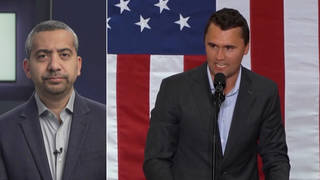
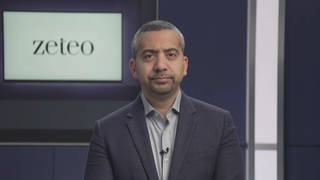
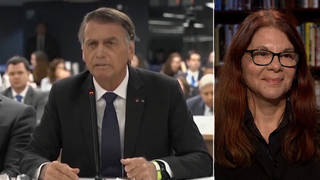
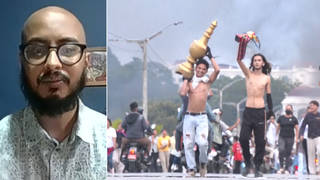






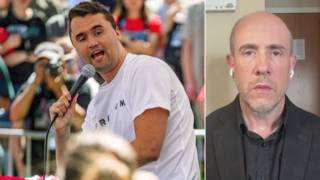
Media Options